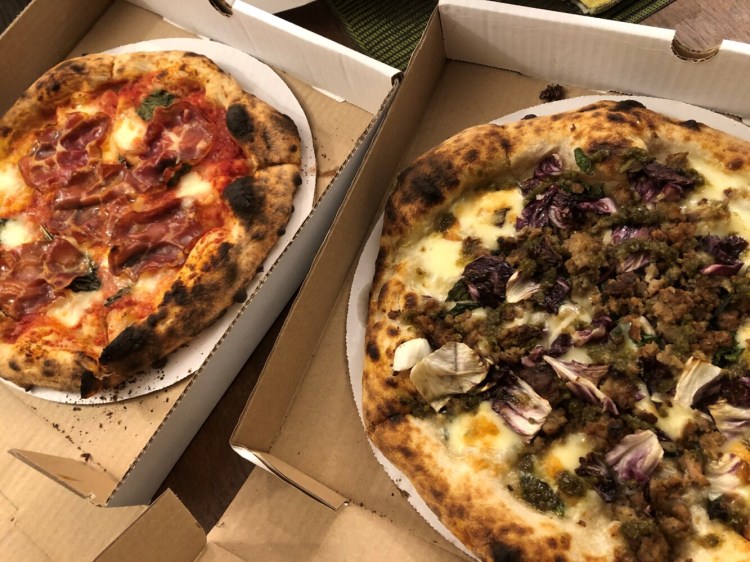I’ve written about food for more than 20 years, yet writing about certain foods still scares me. When I lived in Texas, a recent transplant from New York City, I shied away from barbecue. In the land of barbecue, what did I know? In Maine, writing about lobster makes me anxious. And then there is pizza.
Pizza has its own fanatical groupies. Books have been written, awards have been given, pilgrimages to Naples have been made, lists of The Best have been fiercely debated, friendships have probably ended. I am reluctant to wade into these tomato-stained waters.
Yet, I fell so hard for the Maialino pizza ($18) at the new Radici – on Washington Avenue in Portland – that I am breaking my own rules. Even in the middle of a nor’easter as I write this, I am tempted to drive into town to pick up another one, with its house-made pork sausage, taleggio, radicchio and caper honey (hey, it’s research). It’s salty and a little sweet, rich and surprising bite by bite and slice by slice. The topping is terrific, but it doesn’t steal the spotlight from the deeply flavored crust. The pizza Margherita ($14.50, more with add-ons) is good, too, and I have my eye on the Funghi ($18) and the intriguing, once-a-week dessert – naturally leavened Olive Oil Torta with Apricot Mascarpone ($9).
You can also order things like salad, wine by the bottle, espresso by the cup (“we take espresso very seriously,” is written on the restaurant’s homepage marquee) and Chinotto, a less sweet, more complex Italian soda made from bitter oranges. (My partner, the wise guy, pronounced the drink “Chinottish.”)
The pizza dough at Radici is naturally leavened and mixed entirely by hand. It takes four days to make it, says Randy Forrester, who owns Radici with his wife, Ally; the couple moved up from New Jersey in late 2019, where they had a fine-dining restaurant. He describes himself as a “bread obsessive.”

Radici, a new pizzeria on Washington Avenue. For now, the restaurant is open for pickup only. Photo by Peggy Grodinsky
“You work so hard on the actual dough itself, yet that is the thing that gets overlooked the most,” he said. “Everybody asks, ‘What kind of topping do you want?’ For us, it’s ‘What about the dough?’ ”
Which is not to say Radici neglects the toppings. They’re made with raw Sicilian olive oil, San Marzano tomatoes and mozzarella di bufala imported from Italy. “All the other stuff besides those big ones, we are trying to source as locally as we can,” Randy Forrester said.

The bread at front was a freebie with my order to thank me because I was a repeat customer. Randy Forrester described the loaf as something you could have eaten “in Biblical times.” Photo by Peggy Grodinsky
For now, the pizza is available only at dinner time, also only for (contactless) pickup. Each pizza feeds one generously, and the website – online ordering is required – is simple to navigate. The second time I ordered pizza from Radici, I found a homely, blistered round of chewy, wildly delicious bread with my order, apparently a thank-you for my being a repeat customer. If this pandemic ever ends, the Forresters intend to open the sit-down eatery they’d originally planned.
Randy Forrester probably understands my pizza prose anxiety. He grew up in an Italian-American family in Trenton eating what Trentonians call Tomato Pie, whose merits were “heavily debated” all across town.
“In my house, pizza was a very serious thing, along the line of politics and religion,” he said. “It’s right up there.”
Send questions/comments to the editors.



Comments are no longer available on this story